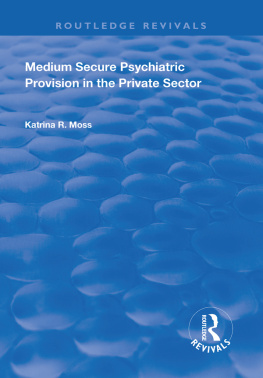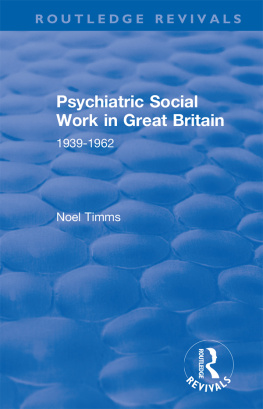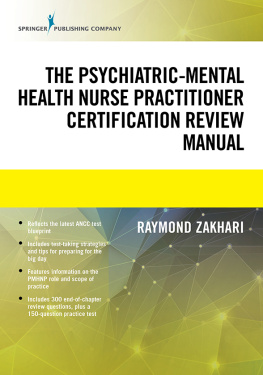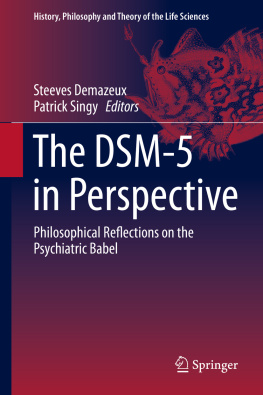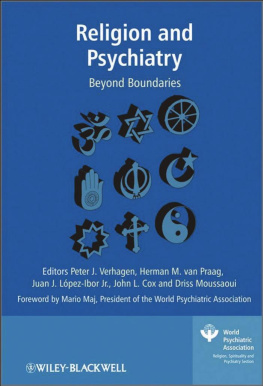MEDIUM SECURE PSYCHIATRIC PROVISION IN THE PRIVATE SECTOR
For Gemma and Christopher
Medium Secure Psychiatric Provision in the Private Sector
KATRINA R. MOSS
First published 1998 by Ashgate Publishing
Reissued 2018 by Routledge
2 Park Square, Milton Park, Abingdon, Oxon OX14 4RN
711 ThirdAvenue, New York, NY 10017, USA
Routledge is an imprint of the Taylor & Francis Group, an informa business
Copyright Katrina R. Moss 1998
All rights reserved. No part of this book may be reprinted or reproduced or utilised in any form or by any electronic, mechanical, or other means, now known or hereafter invented, including photocopying and recording, or in any information storage or retrieval system, without permission in writing from the publishers.
Notice:
Product or corporate names may be trademarks or registered trademarks, and are used only for identification and explanation without intent to infringe.
Publishers Note
The publisher has gone to great lengths to ensure the quality of this reprint but points out that some imperfections in the original copies may be apparent.
Disclaimer
The publisher has made every effort to trace copyright holders and welcomes correspondence from those they have been unable to contact.
ISBN 13: 978-1-138-32752-8 (hbk)
ISBN 13: 978-0-429-44920-8 (ebk)
Contents
The policy of privatisation has been widely discussed over a number of years since its inception, primarily in the United States and its subsequent travel across the Atlantic to the United Kingdom. In both jurisdictions the ideology has been advocated by proponents of libertarian socioeconomic policies and in Britain has received the long-standing commitment of the Conservatives. Notwithstanding this, relatively little attention has been paid to the privatisation of psychiatric care in the United Kingdom. As such, this is a neglected field of study.
Private medical care has been, and remains, a salient feature on the health care landscape. It is significant not only in terms of policy, as a great deal of political importance has been and continues to be attached to it, but also in terms of medicine and concentrates on specific specialties much of the time. It is one of these specialties medium secure independent psychiatric provision with which this study will seek to deal. In doing so it will address the contribution currently being made to the existing public service by the recently introduced private provision.
I would like to thank the following people for their help in making the completion of this book possible.
First I would like to thank Professor Ken Pease for supervising this project and for seeing the thesis on which it is based through to its completion in spite of his move from Manchester to Huddersfield. Although he will not like me saying all these things, (because in spite of his impressive reputation he is a truly modest and self-effacing person) I would still like to thank him for his infinite wisdom, his sound, down-to-earth advice and his endless encouragement and humour.
Thanks must also go to Wendy Buck for her support at the start of this project and for spending so much of her time with me and the SPSS data entry system.
I would like to thank Staffordshire University Law School for their support and most important for allowing me the study leave necessary to complete it, without which it would have been an impossible task.
Thanks also to the staff and patients of Stockton Hall, York, the Hutton Unit, Middlesbrough and the Norvic Clinic, Norwich. In particular to Dr Chris Green who organised my fieldwork at all of these facilities and who put me up (or was it put up with me?) during my stint at the Hutton.
I would like to thank the Department of Social Policy at the University of Manchester for keeping in touch with me throughout the past four years. As a part-time student I have very much appreciated this. I would also like to thank Paul Wilding and Ian Gough who gave me so much encouragement and lent me so many books (all of which I have returned, I hasten to add).
Many thanks to my husband Paul for helping me to collect data at Middlesbrough and Norwich and for explaining chi-square to me! I count myself truly fortunate, although I probably dont ever say it, to have such a wonderful husband.
Thanks also go of course to my Mum and Dad for their interest, encouragement and much appreciated help with the children. Parents of all people often receive the least thanks when they actually deserve the most, so I would like to put the record straight and say thank you for your endless support of my educational endeavours over many many years. I could not have done any of this if it were not for both of you. Thanks also for proving time and time again what a great institution grandparents are.
Finally, I want to mention and thank sincerely all the staff at the North Staffs Oral Surgery Department, but most particularly my hero of the NHS, Consultant Surgeon Peter Leopard, without whose knowledge and expertise I simply would not have been around to finish this. Thank you.
focuses on the meaning of the term privatisation, its origins and development in the United States and the United Kingdom, the philosophical and economic background to this and the policy issues surrounding its implementation.
reviews the range of attitudes surrounding the policy implications of privatisation within the criminal justice system. Specifically it considers the privatisation of prisons in the United States and the United Kingdom, tracing this development and the emotional debate which has surrounded its implementation.
provides a review of the most current literature on the provision of private psychiatric care in the United States and the United Kingdom. This provides insight into the prevalence of, attitudes to and success of private health care and a comparison of the concerns voiced in relation to its implementation. It identifies the issues of access, profit, quality and community needs as being areas of concern in the provision of private psychiatric care and explains the reasons for the subsequent focus of this study on access to that care in both the public and private sectors.
provides an explanation of the legal and medical issues involved in the provision of mental health care, its regulation by the Mental Health Act 1983 and how this legislation deals with persons who are deemed to require psychiatric care in conditions of security. It also explains the procedures necessary for sectioning under the Mental Health Act and the passage into secure care of those deemed by the law to require it.
traces the development of public sector medium secure regional psychiatric provision, the introduction of the Regional Secure Unit and the place which such units occupy in the Mental Health System. It includes an empirical study of admissions and discharges to two public sector Regional Secure Units during the period 1989 to 1992 and seeks to address the issue of access to psychiatric care in the public sector.
discusses the advent of independent medium secure psychiatric care and considers how this sort of provision fits into the national picture of medium secure psych atric care. It includes an empirical study of admissions and discharges to an independent medium secure psychiatric hospital between 1989 and 1992 and illustrates some variations in access to private psychiatric care compared to that provided by the public sector.

